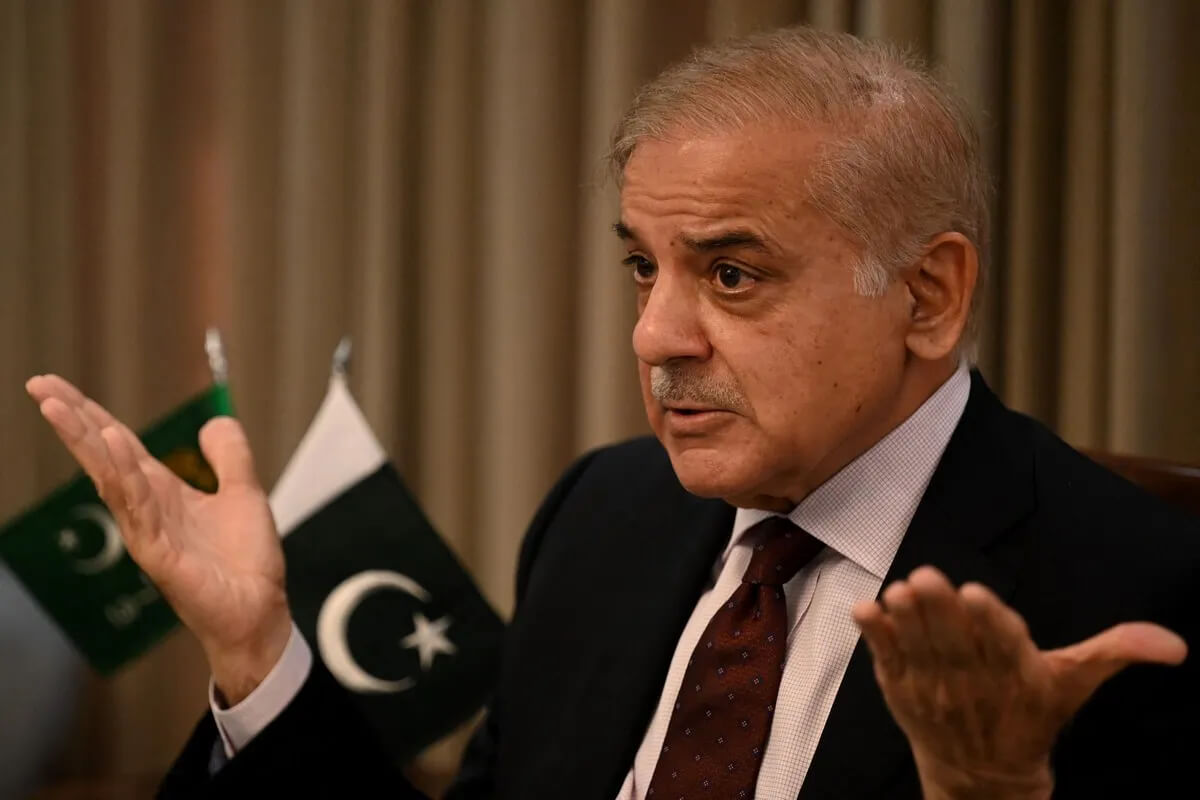Pakistani Prime Minister (PM) Shehbaz Sharif celebrated the International Monetary Fund’s (IMF) decision to release $1.1 billion in bailout funds as a “major step” in “reorienting the economy” and bringing it “back on track.”
He cautioned citizens, however, that the approval of funding would require the government to introduce strict “structural reforms” to make the economy “self-sufficient” and break its “straightjacket.”
In a public address on Monday, Sharif said that the IMF’s bailout package would protect the economy from bankruptcy and put it on the road to economic stability.
The formal resumption of an IMF program is a major step forward in our efforts to put Pakistan's economy back on track. It is outcome of an excellent team effort. I commend Finance Minister Miftah Ismail & his team and other stakeholders for their hard work.
— Shehbaz Sharif (@CMShehbaz) August 29, 2022
Revival of IMF program, though critical to our economy, is not an end in itself. It offers a pathway to reorient our economy. We will have to work hard to make it self-sufficient. Pakistan must break out of economic straitjacket, which is only possible through structural reforms.
— Shehbaz Sharif (@CMShehbaz) August 30, 2022
On Monday, the IMF’s executive board approved the release of $1.1 billion in special drawing rights after completing its seventh and eighth reviews under the Extended Fund Facility (EFF).
A statement by the IMF noted that this brings the total purchases for budget support under the programme to around $3.9 billion.
The organisation projected the Pakistani economy will grow at 3.5% this fiscal year but inflation will hover around 20%.
Noting that Pakistan is at a “challenging economic juncture,” due to the Ukraine war and “procyclical domestic policies,” the IMF also agreed to increase the loan from $6 billion to $6.5 billion and extend the expiry date to June 2023.
It hopes that this disbursement of funds will “address domestic and external imbalances, and ensure fiscal discipline and debt sustainability while protecting social spending, safeguarding monetary and financial stability, and maintaining a market-determined exchange rate and rebuilding external buffers.”
The organisation’s deputy managing director, Antoinette Sayeh, said the Pakistani government needs to “strengthen the viability of the energy sector and reduce unsustainable losses.” She also recommended the “tightening of monetary conditions through higher policy rates” to control inflation.
Alhamdolillah the IMF Board has approved the revival of our EFF program. We should now be getting the 7th & 8th tranche of $1.17 billion. I want to thank the Prime Minister @CMShehbaz for taking so many tough decisions and saving Pakistan from default. I congratulate the nation.
— Miftah Ismail (@MiftahIsmail) August 29, 2022
Pakistani Finance Minister Miftah Ismail celebrated the release of the funds and thanked PM Sharif for “taking tough decisions” and “saving Pakistan from default.”
He noted that all executive directors supported Pakistan’s request except India, which abstained from voting. Nevertheless, he said the government is considering importing vegetables from India.
Ismail blamed the country’s economic woes on Sharif’s predecessor Imran Khan and his PTI party, saying their policies have led to the country’s foreign reserves dipping below $7.8 billion. In particular, it is thought that Khan’s fuel price caps exacerbated the situation.
Sharif, too, has previously criticised the Khan government for increasing the budget deficit from $7.4 billion to $11.5 billion and foreign loans by 80%. The country’s debt now totalling $128 billion and its current account deficit is around $9.2 billion. He said this had forced Pakistan to “literally beg” other countries and the IMF for financial assistance.
I want to thank China, Saudi Arabia, Qatar & UAE for helping us fulfil the financing gap that revived our IMF program.
— Miftah Ismail (@MiftahIsmail) August 29, 2022
I want to thank IMF, World Bank, ADB, AIIB & IDB for their support for Pakistan.
Thanks also to US, UK, EU, Turkey, Japan, Korea and others for the support.
In July 2019, the IMF approved an EFF of $6 billion. However, it stopped releasing the funds after the Khan government refused to make the recommended monetary changes.
After ousting Khan via a trust vote in April, the Sharif administration reluctantly introduced several changes to secure funding from the international financial institution, removing fuel subsidies and lifting the ban on imports of luxury goods. In fact, it has introduced three fuel hikes since coming to power, raising prices by up to 50%. It has also reduced electricity subsidies.
Sharif told the national assembly last month: “We knew it would damage our political reputation, but still we did it,” stressing that the austerity measures were “essential” to stave off default.
As a part of the IMF deal, Pakistan was also required to secure additional funding to cover the remaining budget shortage in the coming fiscal year. To this end, Pakistan secured around $10 billion from China. Additionally, it received over $3 billion from Saudi Arabia, along with $1.2 billion worth of deferred oil payments and $1 billion in investments. The United Arab Emirates will invest a similar amount and release a $2.5 billion loan. Qatar, too, will invest $3 billion in Pakistan.
Opposition leaders at the provincial level continue to resist the IMF’s terms, which require them to maintain a budgetary surplus.
Khyber Pakhtunkhwa’s Finance Minister Jhagra, for instance, has said that implementing the IMF’s demand will be difficult considering the widespread devastation caused by the floods, which have caused over 1,100 deaths and over $10 billion in damages.

